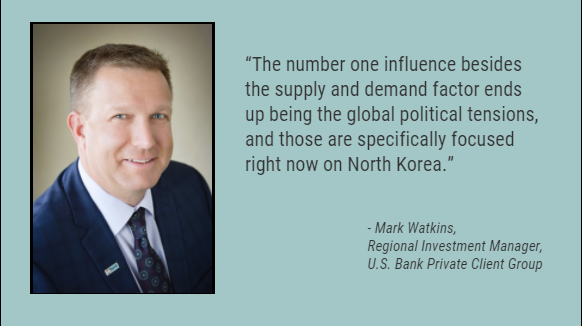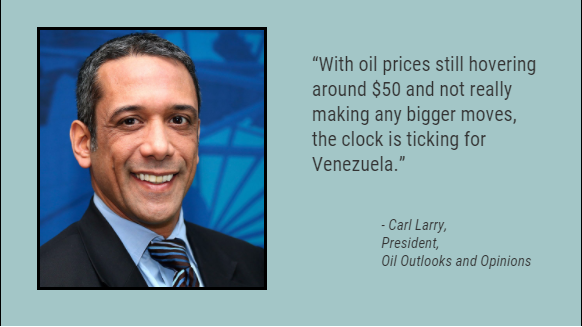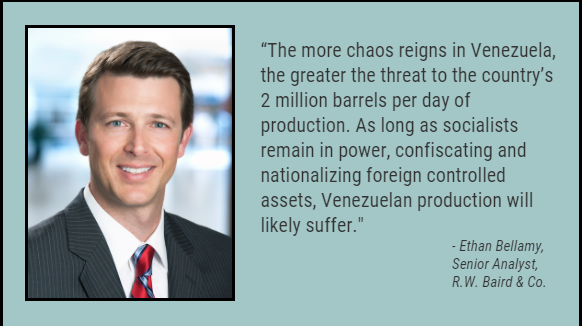Instability unnerves commodity markets, and as tension between the United States and North Korea heightens and the death toll in Venezuela rises, oil prices struggle to regain equilibrium.

The U.S.-N. Korea stand-off is essentially two countries revisiting old wounds. The United States wants the Asian country to disarm and abandon its nuclear dreams; North Korea wants the United States to stop telling it what to do. This has been going on since 2002, when North Korea admitted it had dismissed the 1994 nuclear proliferation agreement.
But truly, the bad blood between the two nations goes all the way back to the Korean War, when North Korea attacked South Korea. The United States supported independent nation to the south.
And the “American imperialists” have been North Korea’s sworn enemies ever since.
Today, North Korea’s leader Kim Jong Un, gets a kick out of taunting the United States with its nuclear weapons program. U.S. President Donald Trump takes the bait and pulls no punches in response to the impertinence. Pre-emptive strikes, sanctions and an oil embargo are among his tools for punishment.
And so there is concern that escalation with North Korea could pull down oil prices. Geopolitical stress can shock the markets, said Mark Watkins, regional investment manager with U.S. Bank Private Client Group.
“The number one influence besides the supply and demand factor ends up being the global political tensions, and those are specifically focused right now on North Korea,” he said.
What’s more, should the United States engage militarily with North Korea, Russia and OPEC may be less willing to keep their production artificially low as the United States benefits from unflagging drilling, he said.
Ethan Bellamy, senior analyst with R.W. Baird & Co., said it’s plausible that North Korea is bringing out the oil bears, but the Venezuelan crisis is more significant to crude prices.

With the world’s largest proved oil reserves, Venezuela is sitting on a veritable gold mine. But whatever you think of socialism or national oil companies, Petroleos de Venezuela SA (PDVSA) takes mismanagement to another level. Or, as Raymond James (RayJa) analysts say, PDVSA is “quite possibly, the worst-managed national oil company in the world.”
Corruption? PDVSA’s got it. Venezuela – which is 95 percent funded by oil money – scores a whopping 166, tied with Iraq, out of 176 countries on Transparency International’s corruption index.
Ill-advised workforce reductions? Most definitely. Back in 2002, striking technical workers were sidelined for taking on then-president Hugo Chavez. That was more than 18,000 people without a job. Fast-forward to now, and the economy is so destitute now that the best of the oil workforce has fled Venezuela in a mass exodus.
Countries such as Colombia are reaping the rewards of PDVSA’s discontent. That country, home to Ecopetrol – a national oil company (NOC) that’s doing it right, according to top RayJa analyst Pavel Molchanov – is accepting an inflow of smart, talented and well-educated oil industry types fleeing poverty in Venezuela.
Not paying the bills? Yup. Foreign investors, such as drilling contractors Schlumberger and Halliburton, are increasingly reluctant to work with PDVSA because the company routinely skips out on its invoices, Molchanov said.
In 2016, Venezuelan oil production dropped 10 percent, he said. The picture is just as bleak this year.
“With oil prices still hovering around $50 and not really making any bigger moves, the clock is ticking for Venezuela,” said Carl Larry, president of Oil Outlooks and Opinions. “[Debt payments] will come back in a few months, and they just don’t have the cushion to keep production – or the facade of production – up, and keep people happy without real income.”
Over-leveraged? You bet. In 2015, PDVSA set aside $18.1 billion for capital spending, but the company paid more than half that total – $9.2 billion – to the government to fund social programs.
“The state oil company has long been the cash cow of the country, but the cow has been over-milked,” Bellamy said.
Taken altogether, it’s not a picture of a healthy company. Throw in the 2016 drought that brought Venezuela’s dependence on hydropower to its knees, and you have an economy steeped in discontent.

As such, protesters out of work, out of food and out of patience, have taken to the streets to demonstrate against the government and its heavy-handed president, Nicolas Maduro. Despite calls for peace, 26 people have died during the last three weeks in Venezuela.
It’s not the protestors and demonstrations that will affect oil prices, Molchanov said. It’s the fear that an escalation to outright revolt could lead to another supply disruption.
Venezuela supplies 2 million barrels of oil per day – 2 percent of the world’s supply. As Molchanov said, if those barrels disappeared from the market, it would be a big deal.
So what’s the answer to PDVSA’s problem, and by extension, the risk to global oil markets? It would appear that a wholesale regime change is in order.
“The more chaos reigns in Venezuela, the greater the threat to the country’s 2 million barrels per day of production. As long as socialists remain in power, confiscating and nationalizing foreign controlled assets, Venezuelan production will likely suffer,” Bellamy said. “Unless a meaningful regime change occurs, we think it is unlikely that multinationals will deploy meaningful incremental capital.”
source: http://www.rigzone.com/news/oil_gas/a/149868/OpEd_Big_Trouble_in_North_Korea_Venezuela_Threaten_Oil_Prices/?pgNum=1
